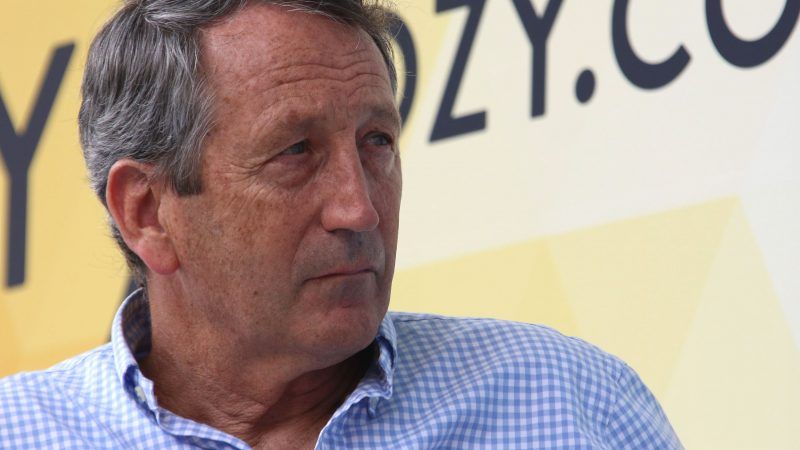Mark Sanford Gives Himself Two Weeks to Decide if He Wants to Be Trump Roadkill
The man who couldn't win a GOP primary on his home turf as an incumbent is polling at just 4%—though even that is better than Bill Weld.

Since trial-ballooning a primary challenge to the incumbent president two weeks ago, former South Carolina governor and congressman Mark Sanford has been busy making such cheery proclamations as "We are caught up in a weird time" and "I don't think anybody's going to beat Donald Trump."
As if to underscore the latter notion, Sanford's name was included in a national presidential poll for the first time in a July 23–28 McLaughlin & Associates survey released Wednesday. The results were grim for the South Carolinian—just 4 percent of 415 likely voters preferred Sanford, compared to 81 percent for Trump. The only candidate with worse polling day yesterday was former Massachusetts governor and 2016 Libertarian Party vice presidential nominee Bill Weld, who limped home with 2 percent.
Sanford said he will make a decision about whether to run over the next two weeks, but it's hard to imagine the math getting any better. Trump's approval rating among Republicans has been between 87 percent and 91 percent all year, and it's been resting comfortably at 90 percent since mid-June. That 81 percent is the highest he has scored in the monthly McLaughlin poll since it began last year. He is outfundraising Weld by a ratio of 150 to 1, and he has rigged the Republican National Committee to an extent that would make Hillary Clinton jealous.
The former Freedom Caucus congressman, who was bounced as an incumbent in a primary last year by an opponent Trump backed at the last minute (who in turn got beaten by a Democrat), has maintained that the central premise of his candidacy is to foreground discussions of debt and deficits at a time when Republicans in power no longer want to hear about the subject. "Fiscal conservatism may be on life support," he told Real Clear Politics this week, "but I don't believe the patient is dead."
Fiscal sobriety is also a core Bill Weld concern, and it's earned him consistent 75-percentage-point deficits in national polls. Gary Johnson made debt/deficits his number-one issue running for Senate in his home state of New Mexico, and it got him just 15.4 percent of the vote, half as much as his unknown Republican opponent. The GOP is the party of trillion-dollar deficits, and fiscal hawks who remain in office are rapidly becoming an endangered species.
"We're the only party that cares about [debt]," Libertarian Party National Committee Chair Nicholas Sarwark told me at Freedom Fest last month. "Do you want to bankrupt your children and grandchildren or not? With issues like this, where neither of the two old party nominees are going to even address the issue, we can unite the country…around the idea of fixing problems and dealing with the issues that Americans have that have been ignored for too long."
Asked to explain why Weld is getting thumped running on that issue, Sarwark quipped, "He picked the wrong team." Asked whether Sanford is making the same mistake, Sarwark said, "Probably." But then Sarwark argued that having libertarian-leaners compete for the GOP nomination is a good thing.
"I wish Bill Weld all the success in the world for the Republican primary," he said. "I think the vehicle can't be saved, but he's doing what he can to save something that he knew. I think that that's noble. I think that to the extent that he can hurt a bad president, I think that's noble. It's a good fight, but it's not our fight….
"The work that Bill Weld is doing is a good step for some people, because if he's speaking libertarian language to Republican primary voters, and he doesn't win that primary, those people are going to have to go somewhere; they're not going to go for the president. They're either going to go for whoever the Democratic nominee is, or they're going to go for the Libertarian nominee. And that creates opportunities for us."
It remains to be seen whether those opportunities will be leveraged by a high-profile contender such as Rep. Justin Amash (I–Mich.), by one of the lower-profile candidates who have already declared, or by some as-yet-undeclared pretender to the third-party throne (maybe even Mark Sanford!). Whoever it is, he or she will be swimming against currents much less favorable than in 2016.


Show Comments (14)